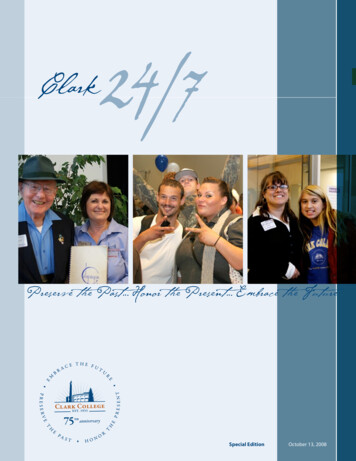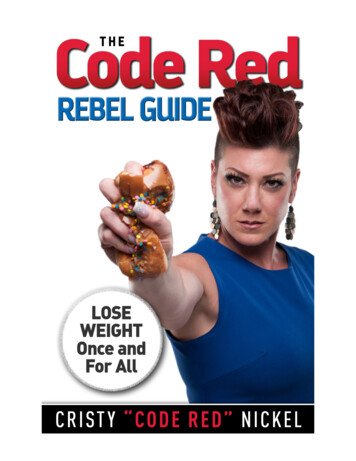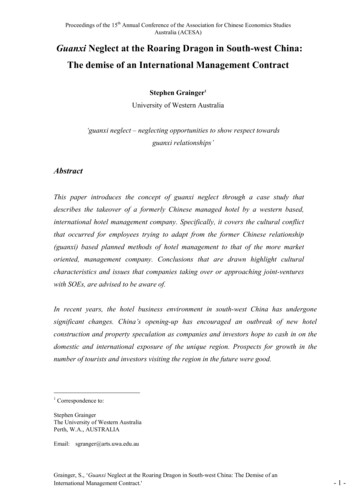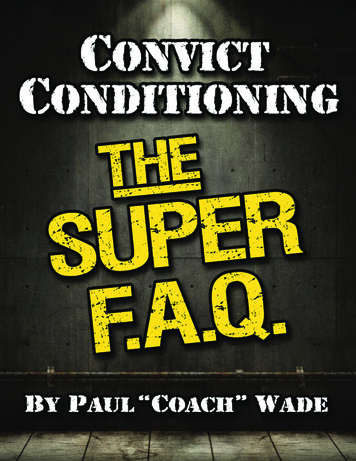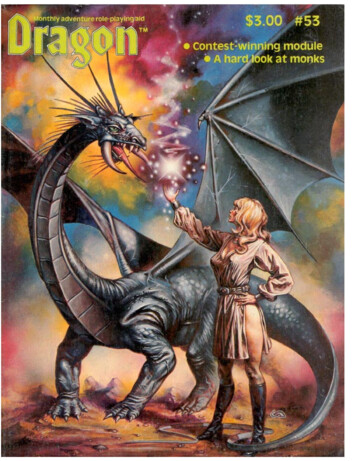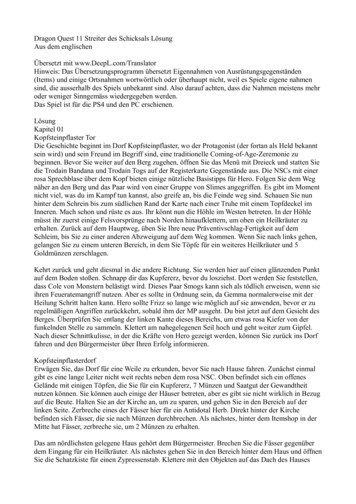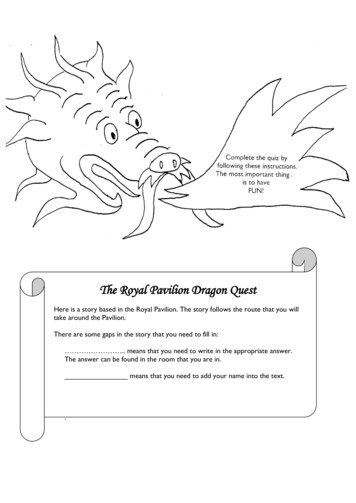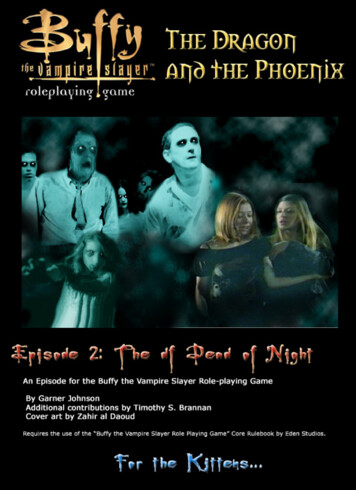
Transcription
Red DragonByThomas HarrisCourtesy:Shahid RiazIslamabad – rProfileAction.ns?id ebdaae62-b650-4f30-99a4-376c0a084226
“Red Dragon” By Thomas Harris2CHAPTER 1Will Graham sat Crawford down at a picnic table between the house and the oceanand gave him a glass of iced tea.Jack Crawford looked at the pleasant old house, salt-silvered wood in the clearlight. "I should have caught you in Marathon when you got off work," he said. "Youdon't want to talk about it here.""I don't want to talk about it anywhere, Jack. You've got to talk about it, so let'shave it. Just don't get out any pictures. If you brought pictures, leave them in thebriefcase -Molly and Willy will be back soon.""How much do you know?""What was in the Miami Herald and the Times," Graham said. "Two families killedin their houses a month apart. Birmingham and Atlanta. The circumstances weresimilar.""Not similar. The same.""How many confessions so far?""Eighty-six when I called in this afternoon," Crawford said. "Cranks. None of themknew details. He smashes the mirrors and uses the pieces. None of them knew that.""What else did you keep out of the papers?""He's blond, right-handed and really strong, wears a size-eleven shoe. He can tie abowline. The prints are all smooth gloves.""You said that in public.""He's not too comfortable with locks," Crawford said. "Used a glass cutter and asuction cup to get in the house last time. Oh, and his blood's AB positive.""Somebody hurt him?""Not that we know of. We typed him from semen and saliva. He's a secretor."Crawford looked out at the flat sea. "Will, I want to ask you something. You saw thisin the papers. The second one was all over the TV. Did you ever think about givingme a call?""Why not?""There weren't many details at first on the one in Birmingham. It could have beenanything - revenge, a relative.""But after the second one, you knew what it was.""Yeah. A psychopath. I didn't call you because I didn't want to. I know who youhave already to work on this. You've got the best lab. You'd have Heimlich atHarvard, Bloom at the University of Chicago-""And I've got you down here fixing fucking boat motors.""I don't think I'd be all that useful to you, Jack. I never think about it anymore.""Really? You caught two. The last two we had, you caught.""How? By doing the same things you and the rest of them are doing."2
“Red Dragon” By Thomas Harris3"That's not entirely true, Will. It's the way you think.""I think there's been a lot of bullshit about the way I think.""You made some jumps you never explained.""The evidence was there," Graham said."Sure. Sure there was. Plenty of it - afterward. Before the collar there was so damnlittle we couldn't get probable cause to go in.""You have the people you need, Jack. I don't think I'd be an improvement. I camedown here to get away from that.""I know it. You got hurt last time. Now you look all right.""I'm all right. It's not getting cut. You've been cut.""I've been cut, but not like that.""It's not getting cut. I just decided to stop. I don't think I can explain it.""If you couldn't look at it anymore, God knows I'd understand that.""No. You know-having to look. It's always bad, but you get so you can functionanyway, as long as they're dead. The hospital, interviews, that's worse. You have toshake it off and keep on thinking. I don't believe I could do it now. I could makemyself look, but I'd shut down the thinking.""These are all dead, Will," Crawford said as kindly as he could.Jack Crawford heard the rhythm and syntax of his own speech in Graham's voice.He had heard Graham do that before, with other people. Often in intenseconversation Graham took on the other person's speech patterns. At first, Crawfordhad thought he was doing it deliberately, that it was a gimmick to get the back-andforth rhythm going.Later Crawford realized that Graham did it involuntarily, that sometimes he tried tostop and couldn't.Crawford dipped into his jacket pocket with two fingers. He flipped two photographsacross the table, face up."All dead," he said.Graham stared at him a moment before picking up the pictures.They were only snapshots: A woman, followed by three children and a duck,carried picnic items up the bank of a pond. A family stood behind a cake.After half a minute he put the photographs down again. He pushed them into astack with his finger and looked far down the beach where the boy hunkered,examining something in the sand. The woman stood watching, hand on her hip,spent waves creaming around her ankles. She leaned inland to swing her wet hairoff her shoulders.Graham, ignoring his guest, watched Molly and the boy for as long as he hadlooked at the pictures.Crawford was pleased. He kept the satisfaction out of his face with the same carehe had used to choose the site of this conversation. He thought he had Graham. Letit cook.3
“Red Dragon” By Thomas Harris4Three remarkably ugly dogs wandered up and flopped to the ground around thetable."My God," Crawford said."These are probably dogs," Graham explained. "People dump small ones here allthe time. I can give away the cute ones. The rest stay around and get to be bigones.""They're fat enough.""Molly's a sucker for strays.""You've got a nice life here, Will. Molly and the boy. How old is he?""Eleven.""Good-looking kid. He's going to be taller than you."Graham nodded. "His father was. I'm lucky here. I know that.""I wanted to bring Phyllis down here. Florida. Get a place when I retire, and stopliving like a cave fish. She says all her friends are in Arlington.""I meant to thank her for the books she brought me in the hospital, but I never did.Tell her for me.""I'll tell her."Two small bright birds lit on the table, hoping to find jelly. Crawford watched themhop around until they flew away."Will, this freak seems to be in phase with the moon. He killed the Jacobis inBirmingham on Saturday night, June 28, full moon. He killed the Leeds family inAtlanta night before last, July 26. That's one day short of a lunar month. So if we'relucky we may have a little over three weeks before he does it again.""I don't think you want to wait here in the Keys and read about the next one in yourMiami Herald. Hell, I'm not the pope, I'm not saying what you ought to do, but I wantto ask you, do you respect my judgment, Will?""Yes.""I think we have a better chance to get him fast if you help. Hell, Will, saddle upand help us. Go to Atlanta and Birmingham and look, then come on to Washington.Just TDY."Graham did not reply.Crawford waited while five waves lapped the beach. Then he got up and slung hissuit coat over his shoulder. "Let's talk after dinner.""Stay and eat."Crawford shook his head. "I'll come back later. There'll be messages at the HolidayInn and I'll be a while on the phone. Tell Molly thanks, though."Crawford's rented car raised thin dust that settled on the bushes beside the shellroad.Graham returned to the table. He was afraid that this was how he would rememberthe end of Sugarloaf Key-ice melting in two tea glasses and paper napkins flutteringoff the redwood table in the breeze and Molly and Willy far down the beach.4
“Red Dragon” By Thomas Harris5###Sunset on Sugarloaf, the herons still and the red sun swelling.Will Graham and Molly Foster Graham sat on a bleached drift log, their facesorange in the sunset, backs in violet shadow. She picked up his hand."Crawford stopped by to see me at the shop before he came out here," she said."He asked directions to the house. I tried to call you. You really ought to answer thephone once in a while. We saw the car when we got home and went around to thebeach.""What else did he ask you?""How you are.""And you said?""I said you're fine and he should leave you the hell alone. What does he want youto do?""Look at evidence. I'm a forensic specialist, Molly. You've seen my diploma.""You mended a crack in the ceiling paper with your diploma, I saw that." Shestraddled the log to face him. "If you missed your other life, what you used to do, Ithink you'd talk about it. You never do. You're open and calm and easy now. . .I lovethat.""We have a good time, don't we?"Her single styptic blink told him he should have said something better. Before hecould fix it, she went on."What you did for Crawford was bad for you. He has a lot of other people - thewhole damn government I guess - why can't he leave us alone?""Didn't Crawford tell you that? He was my supervisor the two times I left the FBIAcademy to go back to the field. Those two cases were the only ones like this heever had, and Jack's been working a long time. Now he's got a new one. This kind ofpsychopath is very rare. He knows I've had. . . experience.""Yes, you have," Molly said. His shirt was unbuttoned and she could see thelooping scar across his stomach. It was finger width and raised, and it never tanned.It ran down from his left hipbone and turned up to notch his rib cage on the otherside.Dr. Hannibal Lecter did that with a linoleum knife. It happened a year before Mollymet Graham, and it very nearly killed him. Dr. Lecter, known in the tabloids as"Hannibal the Cannibal," was the second psychopath Graham had caught.When he finally got out of the hospital, Graham resigned ftom the Federal Bureauof Investigation, left Washington and found a job as a diesel mechanic in theboatyard at Marathon in the Florida Keys. It was a trade he grew up with. He slept ina trailer at the boatyard until Molly and her good ramshackle house on SugarloafKey.Now he straddled the drift log and held both her hands. Her feet burrowed underhis.5
“Red Dragon” By Thomas Harris 6"All right, Molly. Crawford thinks I have a knack for the monsters. It's like asuperstition with him.""Do you believe it?"Graham watched three pelicans fly in line across the tidal flats. "Molly, an intelligentpsychopath - particularly a sadist - is hard to catch for several reasons. First, there'sno traceable motive. So you can't go that way. And most of the time you won't haveany help from informants. See, there's a lot more stooling than sleuthing behind mostarrests, but in a case like this there won't be any informants. He may not even knowthat he's doing it. So you have to take whatever evidence you have and extrapolate.You try to reconstruct his thinking. You try to find patterns.""And follow him and find him," Molly said. "I'm afraid if you go after this maniac, orwhatever he is - I'm afraid he'll do you like the last one did. That's it. That's whatscares me.""He'll never see me or know my name, Molly. The police, they'll have to take himdown if they can find him, not me. Crawford just wants another point of view."She watched the red sun spread over the sea. High cirrus glowed above it.Graham loved the way she turned her head, artlessly giving him her less perfectprofile. He could see the pulse in her throat, and remembered suddenly andcompletely the taste of salt on her skin. He swallowed and said, "What the hell can Ido?""What you've already decided. If you stay here and there's more killing, maybe itwould sour this place for you. High Noon and all that crap. If it's that way, you weren'treally asking.""If I were asking, what would you say?""Stay here with me. Me. Me. Me. And Willy, I'd drag him in if it would do any good.I'm supposed to dry my eyes and wave my hanky. If things don't go so well, I'll havethe satisfaction that you did the right thing. That'll last about as long as taps. Then Ican go home and switch one side of the blanket on.""I'd be at the back of the pack.""Never in your life. I'm selfish, huh?""I don't care.""Neither do I. It's keen and sweet here. All the things that happen to you beforemake you know it. Value it, I mean."He nodded."Don't want to lose it either way," she said."Nope. We won't, either."Darkness fell quickly and Jupiter appeared, low in the southwest.They walked back to the house beside the rising gibbous moon. Far out past thetidal flats, bait fish leaped for their lives.###6
“Red Dragon” By Thomas Harris 7Crawford came back after dinner. He had taken off his coat and tie and rolled uphis sleeves for the casual effect. Molly thought Crawford's thick pale forearms wererepulsive. To her he looked like a damnably wise ape. She served him coffee underthe porch fan and sat with him while Graham and Willy went out to feed dogs. Shesaid nothing. Moths batted softly at the screens."He looks good, Molly," Crawford said. "You both do - skinny and brown.""Whatever I say, you'll take him anyway, won't you?""Yeah. I have to. I have to do it. But I swear to God, Molly, I'll make it as easy onhim as I can. He's changed. It's great you got married.""He's better and better. He doesn't dream so often now. He was really obsessedwith the dogs for a while. Now he just takes care of them; he doesn't talk about themall the time. You're his friend, Jack. Why can't you leave him alone?""Because it's his bad luck to be the best. Because he doesn't think like otherpeople. Somehow he never got in a rut.""He thinks you want him to look at evidence.""I do want him to look at evidence. There's nobody better with evidence. But he hasthe other thing too. Imagination, projection, whatever. He doesn't like that part of it.""You wouldn't like it either if you had it. Promise me something, Jack. Promise meyou'll see to it he doesn't get too close. I think it would kill him to have to fight.""He won't have to fight. I can promise you that."When Graham finished with the dogs, Molly helped him pack.CHAPTER 2Will Graham drove slowly past the house where the Charles Leeds family had livedand died. The windows were dark. One yard light burned. He parked two blocksaway and walked back through the warm night, carrying the Atlanta police detectives'report in a card-board box.Graham had insisted on coming alone. Anyone else in the house would distracthim -that was the reason he gave Crawford. He had another, private reason: he wasnot sure how he would act. He didn't want a face aimed at him all the time.He had been all right at the morgue.The two-story brick home was set back from the street on a wooded lot. Grahamstood under the trees for a long time looking at it. He tried to be still inside. In hismind a silver pendulum swung in darkness. He waited until the pendulum was still.A few neighbors drove by, looking at the house quickly and looking away. A murderhouse is ugly to the neighbors, like the face of someone who betrayed them. Onlyoutsiders and children stare.The shades were up. Graham was glad. That meant no relatives had been inside.Relatives always lower the shades.7
“Red Dragon” By Thomas Harris 8He walked around the side of the house, moving carefully, not using his flashlight.He stopped twice to listen. The Atlanta police knew he was here, but the neighborsdid not. They would be jumpy. They might shoot.Looking in a rear window, he could see all the way through to the light in the frontyard, past silhouettes of furniture. The scent of Cape jasmine was heavy in the air. Alatticed porch ran across most of the back. On the porch door was the seal of theAtlanta police department. Graham removed the seal and went in.The door from the porch into the kitchen was patched with plywood where thepolice had taken out the glass. By flashlight he unlocked it with the key the policehad given him. He wanted to turn on lights. He wanted to put on his shiny badge andmake some official noises to justify himself to the silent house where five people haddied. He did none of that. He went into the dark kitchen and sat down at thebreakfast table.Two pilot lights on the kitchen range glowed blue in the dark. He smelled furniturepolish and apples.The thermostat clicked and the air conditioning came on. Graham started at thenoise, felt a trickle of fear. He was an old hand at fear. He could manage this one.He simply was afraid, and he could go on anyway.He could see and hear better afraid; he could not speak as concisely, and fearsometimes made him rude. Here, there was nobody left to speak to, there wasnobody to offend anymore.Madness came into this house through that door into this kitchen, moving on sizeeleven feet. Sitting in the dark, he sensed madness like a bloodhound sniffs a shirt.Graham had studied the detectives' report at Atlanta Homicide for most of the dayand early evening. He remembered that the light on the vent hood over the stovehad been on when the police arrived. He turned it on now.Two framed samplers hung on the wall beside the stove. One said "Kissin' don'tlast, cookin' do." The other was "It's always to the kitchen that our friends best like tocome, to hear the heartbeat of the house, take comfort in its hum."Graham looked at his watch. Eleven-thirty P.M. According to the pathologist, thedeaths occurred between eleven P.M. and one AM.First there was the entry. He thought about that . . .The madman slipped the hook on the outside screen door. Stood in the darknessof the porch and took something from his pocket. A suction cup, maybe the base of apencil sharpener designed to stick to a desktop.Crouched against the wooden lower half of the kitchen door, the madman raisedhis head to peer through the glass. He put out his tongue and licked the cup,pressed it to the glass and flicked the lever to make it stick. A small glass cutter wasattached to the cup with string so that he could cut a circle.Tiny squeal of the glass cutter and one solid tap to break the glass. One hand totap, one hand to hold the suction cup. The glass must not fall. The loose piece ofglass is slightly egg-shaped because the string wrapped around the shaft of thesuction cup as he cut. A little grating noise as he pulls the piece of glass backoutside. He does not care that he leaves AB saliva on the glass.8
“Red Dragon” By Thomas Harris 9His hand in the tight glove snakes in through the hole, finds the lock. The dooropens silently. He is inside. In the light of the vent hood he can see his body in thisstrange kitchen. It is pleasantly cool in the house.Will Graham ate two Di-Gels. The crackle of the cellophane irritated him as hestuffed it in his pocket. He walked through the living room, holding his flashlight wellaway from him by habit. Though he had studied the floor plan, he made one wrongturn before he found the stairs. They did not creak.Now he stood in the doorway of the master bedroom. He could see faintly withoutthe flashlight. A digital clock on a nightstand projected the time on the ceiling and anorange night light burned above the baseboard by the bathroom. The coppery smellof blood was strong.Eyes accustomed to the dark could see well enough. The madman coulddistinguish Mr. Leeds from his wife. There was enough light for him to cross theroom, grab Leeds's hair and cut his throat. What then? Back to the wall switch, agreeting to Mrs. Leeds and then the gunshot that disabled her?Graham switched on the lights and bloodstains shouted at him from the walls, fromthe mattress and the floor. The very air had screams smeared on it. He flinched fromthe noise in this silent room full of dark stains drying.Graham sat on the floor until his head was quiet. Still, still, be still.The number and variety of the bloodstains had puzzled Atlanta detectives trying toreconstruct the crime. All the victims were found slain in their beds. This was notconsistent with the locations of the stains.At first they believed Charles Leeds was attacked in his daughter's room and hisbody dragged to the master bedroom. Close examination of the splash patternsmade them reconsider.The killer's exact movements in the rooms were not yet deterrnined.Now, with the advantage of the autopsy and lab reports, Will Graham began to seehow it had happened.The intruder cut Charles Leeds's throat as he lay asleep beside his wife, went backto the wall switch and turned on the light - hairs and oil from Mr. Leeds's head wereleft on the switchplate by a smooth glove. He shot Mrs. Leeds as she was rising,then went toward the children's rooms.Leeds rose with his cut throat and tried to protect the children, losing great gouts ofblood and an unmistakable arterial spray as he tried to fight. He was shoved away,fell and died with his daughter in her room.One of the two boys was shot in bed. The other boy was also found in bed, but hehad dust balls in his hair. Police believed he was dragged out from under his bed tobe shot.When all of them were dead, except possibly Mrs. Leeds, the smashing of mirrorsbegan, the selection of shards, the further attention to Mrs. Leeds.Graham had full copies of all the autopsy protocols in his box. Here was the one onMrs. Leeds. The bullet entered to the right of her navel and lodged ii] her lumbarspine, but she died of strangulation.9
“Red Dragon” By Thomas Harris 10The increase in serotonin and free histamine levels in the gunshot woundindicated she had lived at least five minutes after she was shot. The histamine wasmuch higher than the serotonin, so she had not lived more than fifteen minutes. Mostof her other injuries were probably, but not conclusively, postmortem.If the other injuries were postmortem, what was the killer doing in the interval whileMrs. Leeds waited to die? Graham wondered. Struggling with Leeds and killing theothers, yes, but that would have taken less than a minute. Smashing the mirrors. Butwhat else?The Atlanta detectives were thorough. They had measured and photographedexhaustively, had vacuumed and grid-searched and taken the traps from the drains.Still, Graham looked for himself.From the police photographs and taped outlines on the mattresses, Graham couldsee where the bodies had been found. The evidence - nitrate traces on bedclothes inthe case of the gunshot wounds - indicated that they were found in positionsapproximating those in which they died.But the profusion of bloodstains and matted sliding marks on the hall carpetremained unexplained. One detective had theorized that some of the victims tried tocrawl away from the killer. Graham did not believe it - clearly the killer moved themafter they were dead and then put them back the way they were when he killed them.What he did with Mrs. Leeds was obvious. But what about the others? He had notdisfigured them further, as he did Mrs. Leeds. The children each suffered a singlegunshot wound in the head. Charles Leeds bled to death, with aspirated bloodcontributing. The only additional mark on him was a superficial ligature mark aroundhis chest, believed to be postmortem. What did the killer do with them after theywere dead?From his box Graham took the police photographs, lab reports on the individualblood and organic stains in the room and standard comparison plates of blood-droptrajectories.He went over the upstairs rooms minutely, trying to match injuries to stains, tryingto work backward. He plotted each splash on a measured field sketch of the masterbedroom, using the standard comparison plates to estimate the direction and velocityof the bloodfall. In this way he hoped to learn the positions the bodies were in atdifferent times.Here was a row of three bloodstains slanting up and around a corner of thebedroom wall. Here were three faint stains on the carpet beneath them. The wallabove the headboard on Charles Leeds's side of the bed was bloodstained, andthere were swipes along the baseboards. Graham's field sketch began to look like ajoin-the-'lots puzzle with no numbers. He stared at it, looked up at the room and backto the sketch until his head ached.He went into the bathroom and took his last two Bufferin, scooping up water in hishand from the faucet in the sink. He splashed water on his face and dried it with hisshirttail. Water spilled on the floor. He had forgotten that the trap was gone from thedrain. Otherwise the bathroom was undisturbed, except for the broken mirror andtraces of the red fingerprint powder called Dragon's Blood. Toothbrushes, facialcream, razor, were all in place.The bathroom looked as though a family still used it. Mrs. Leeds's panty hose hungon the towel racks where she had left them to dry. He saw that she cut the leg off a10
“Red Dragon” By Thomas Harris 11pair when it had a runner so she could match two one-legged pairs, wear them atthe same time, and save money. Mrs. Leeds's small, homey economy pierced him;Molly did the same thing.Graham climbed out a window onto the porch roof and sat on the gritty shingles.He hugged his knees, his damp shirt pressed cold across his back, and snorted thesmell of slaughter out of his nose.The lights of Atlanta rusted the night sky and the stars were hard to see. The nightwould be clear in the Keys. He could be watching shooting stars with Molly and Willy,listening for the whoosh they solemnly agreed a shooting star must make. The DeltaAquarid meteor shower was at its maximum, and Willy was up for it.He shivered and snorted again. He did not want to think of Molly now. To do sowas tasteless as well as distracting.Graham had a lot of trouble with taste. Often his thoughts were not tasty. Therewere no effective partitions in his mind. What he saw and learned touched everythingelse he knew. Some of the combinations were hard to live with. But he could notanticipate them, could not block and repress. His learned values of decency andpropriety tagged along, shocked at his associations, appalled at his dreams; sorrythat in the bone arena of his skull there were no forts for what he loved. Hisassociations came at the speed of light. His value judgments were at the pace of aresponsive reading. They could never keep up and direct his thinking.He viewed his own mentality as grotesque but useful, like a chair made of antlers.There was nothing he could do about it.Graham turned off the lights in the Leeds house and went out through the kitchen.At the far end of the hack porch, his flashlight revealed a bicycle and a wicker dogbed. There was a doghouse in the backyard, a dog bowl by the steps.The evidence indicated the Leedses were surprised in their sleep. Holding theflashlight between his chin and chest, he wrote a memo: Jack - where was the dog?Graham drove hack to his hotel. He had to concentrate on his driving, though therewas little traffic at four-thirty A.M. His head still ached and he watched for an all-nightpharmacy.He found one on Peachtree. A slovenly rent-a-cop dozed near the door. Apharmacist in a jacket dingy enough to highlight his dandruff sold Graham Bufferin.The glare in the place was painful. Graham disliked young pharmacists. They had amiddle-of-the-litter look about them. They were often smug and he suspected thatthey were unpleasant at home."What else?" the pharmacist said, his fingers poised above the cash register keys."What else?"The Atlanta FBI office had booked him into an absurd hotel near the city's newPeachtree Center. It had glass elevators shaped like milkweed pods to let him knowhe was really in town now.Graham rode up to his room with two conventioneers wearing name tags with theprinted greeting "Hi!" They held to the rail and looked over the lobby as theyascended."Looka yonder by the desk - that's Wilma and them just now coming in," the largerone said. "God damn, I'd love to tear off a piece of that."11
“Red Dragon” By Thomas Harris 12"Fuck her till her nose bleeds," the other one said.Fear and rut, and anger at the fear."Say, you know why a woman has legs?""Why?""So she won't leave a trail like a snail."The elevator doors opened."Is this it? This is it," the larger one said. He lurched against the facing as he gotoff."This is the blind leading the blind," the other one said.Graham put his cardboard box on the dresser in his room. Then he put it in adrawer where he could not see it. He had had enough of the wide-eyed dead. Hewanted to call Molly, but it was too early.A meeting was scheduled for eight A.M. at the Atlanta police headquarters. He'dhave little enough to tell them.He would try to sleep. His mind was a busy rooming house with arguments allaround him, and they were fighting somewhere down the hall. He was numb andempty and he drank two fingers of whiskey from his bathroom glass before he laydown. The darkness pressed too closely on him. He turned on the bathroom lightand went back to bed. He pretended Molly was in the bathroom brushing her hair.Lines from the autopsy protocols sounded in his own voice, though he had neverread them aloud: ". . . the feces was formed . . . a trace of talcum on the lower rightleg. Fracture of the medial orbit wall owing to insertion of mirror shard . . ."Graham tried to think about the beach at Sugarloaf Key, he tried to hear the waves.He pictured his workbench in his mind and thought about the escapement for thewater clock he and Willy were building. He sang "Whiskey River" under his breathand tried to run "Black Mountain Rag" through his head from one end to the other.Molly's music. Doe Watson's guitar part was all right, but he always lost it in thefiddle break. Molly had tried to teach him clog dancing in the backyard and she wasbouncing . . . and finally he dozed.He woke in an hour, rigid and sweating, seeing the other pillow silhouetted againstthe bathroom light and it was Mrs. Leeds lying beside him bitten and torn, mirroredeyes and blood like the legs of spectacles over her temples and ears. He could notturn his head to face her. Brain screaming like a smoke alarm, he put his hand overthere and touched dry cloth.Having acted, he felt some immediate relief. He rose, his heart pounding, and puton a dry T-shirt. He threw the wet one into the bathtub. He could not move over tothe dry side of the bed. Instead he put a towel on the side where he had sweatedand lay down on it, propped against the headboard with a stiff drink in his hand. Heswallowed a third of it.He reached for something to think about, anything. The pharmacy where he boughtthe Bufferin, then; perhaps because it was his only experience all day that was notrelated to death.He could remember old d
"I don't think you want to wait here in the Keys and read about the next one in your Miami Herald. Hell, I'm not the pope, I'm not saying what you ought to do, but I want to ask you, do you respect my judgment, Will?" "Yes." "I think we have a better chance to get
